Mobile Video Monthly #20 – January 2022
App News
October 13, 2022
While you’ve probably been playing Wordle like everyone else this month, a lot happened in the app world. Our five letters word of the day is recap because we’ve always got your back with everything you need to know.
Custom Product Pages are coming to Apple Search Ads
Earlier in January, Apple put an end to Search Ads’ creative sets, to make room for Custom Product Pages.
Custom Product Pages can now be used to create ad variations for Apple’s Search Ads tool. The custom product page you select while creating your ASA will determine the matching ad creative, creating a seamless experience.
However, custom ads will only appear on devices using iOS 15.2 or later. Other users will see your default ad.
In-App Events Analytics are back
Mid-December, iOS developers found out they could no longer access analytics for in-app events. That was corrected on January 6th when Apple announced analytics were available for all in-app events, allowing developers to view relevant metrics.
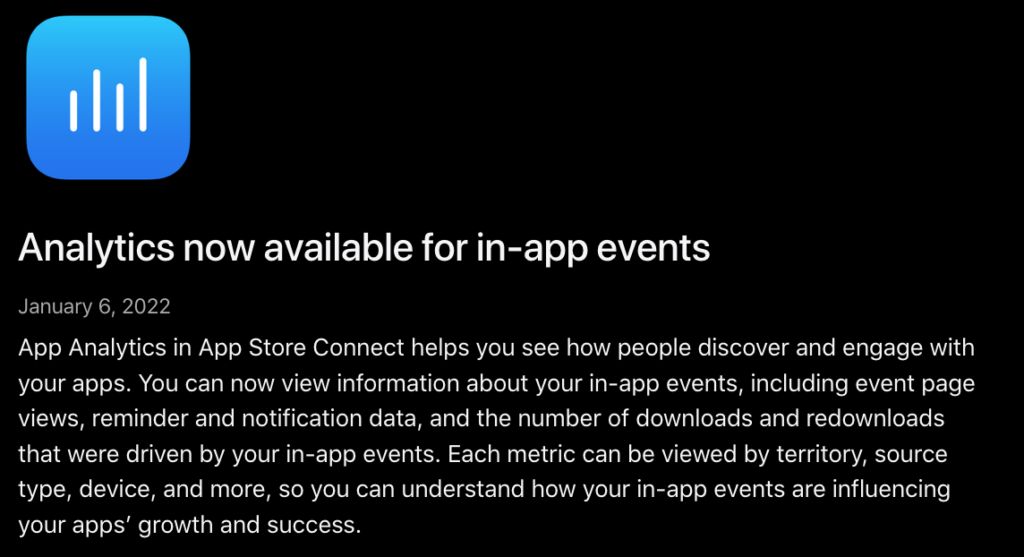
Google replaces FLoC with Topics
You may remember that Google’s plan to end third-party cookies involved their replacement with something called FLoC (short for Federated Learning of Cohorts). It sparked a big debate in the tech community about the relevance of this tool for targeted advertising. FLoC planned on bundling users in cohorts according to their browser history.
With Topics, Google will determine the top interests of users for the week (based on the websites they visited) and let advertisers target through those topics. Users will have the possibility to see their topics and manage or delete them. Topic’s developer trial should be launched soon.
The App Store side payment will come with a commission
Apple may have gotten a delay on the decision of the Epic trial, but they still have to implement alternative payment systems in several places, mainly South Korea and the Netherlands (although it’s only for dating apps there). Moreover, Epic found some new allies in their battle to prove the App Store is a monopoly. 35 US states attorneys, the Electronic Frontier Foundation, and Microsoft have joined the fight against the Cupertino firm.
They’re finally on the verge of providing alternative payment options in South Korea, to comply with the country’s recent law. Apple has said they would offer a reduced charge for alternative side payments, so while they will collect a commission it should be under 30%.
As for the Netherlands, Apple did say they would still collect a charge too (27% instead of the usual 30%) but they also added an extra step. Dating apps developers will need to provide another (completely separate) app binary to be able to offer an alternative payment method.
Meanwhile, India is the latest in a long list of countries accusing Apple of monopoly, saying their 30% commission is hurting developers. And another US State, this time it’s Illinois, is working on a new bill that could force Apple (and Google too) to allow alternative payment in app stores.
A brand new offers tab for the Play Store
First announced in November, the offers tab is finally here (for some countries at least). The new tab, accessible directly on the Play Store home page, will roll out to the US, India, and Indonesia in the coming weeks, before becoming available to more countries later this year.
Offers is the place to discover deals in games and apps. Developers can use it to share information about promotions or updates, bundle offers, free trials, etc. Will you try it out?
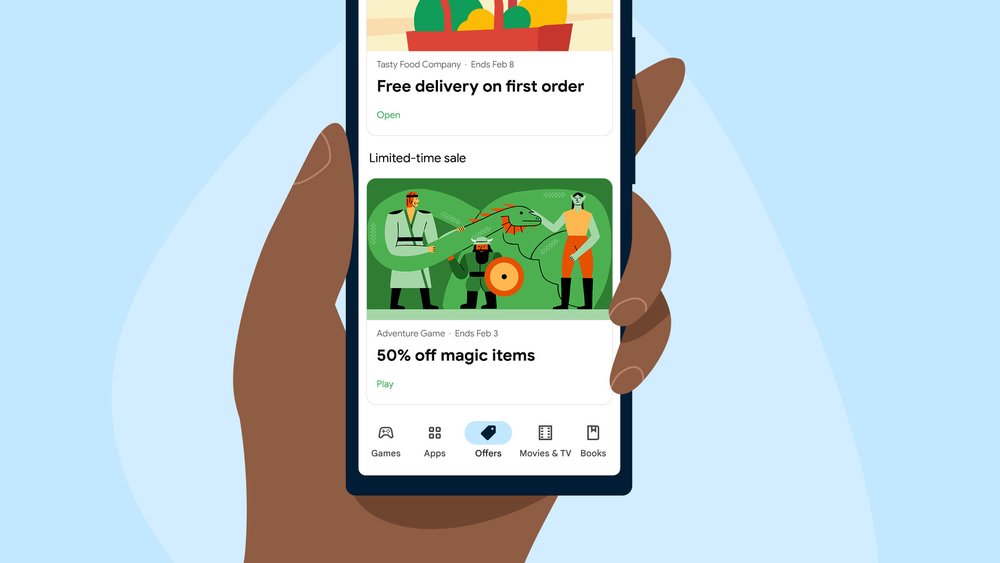
App Annie’s State of Mobile 2022 report is here
Earlier in January, App Annie released their yearly State of Mobile report. Let’s take a quick look at what’s been said.
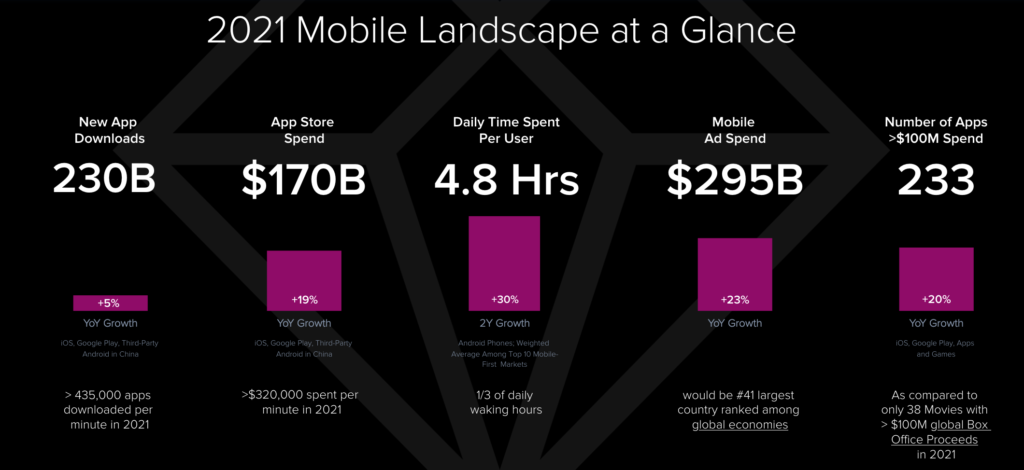
The mobile industry is doing well. People downloaded more apps, spent more in the app stores and apps, and spent more time on their mobile than they did in 2020. Mobile is still a booming industry, 2 million new apps and games were released last year.
Mobile games are also keeping up with 2020’s momentum with their total consumer spend reaching $116 billion, a $15,49 billion growth from the previous year. Hypercasual are still the big winners in terms of downloads with Puzzles gaining ground over Action.
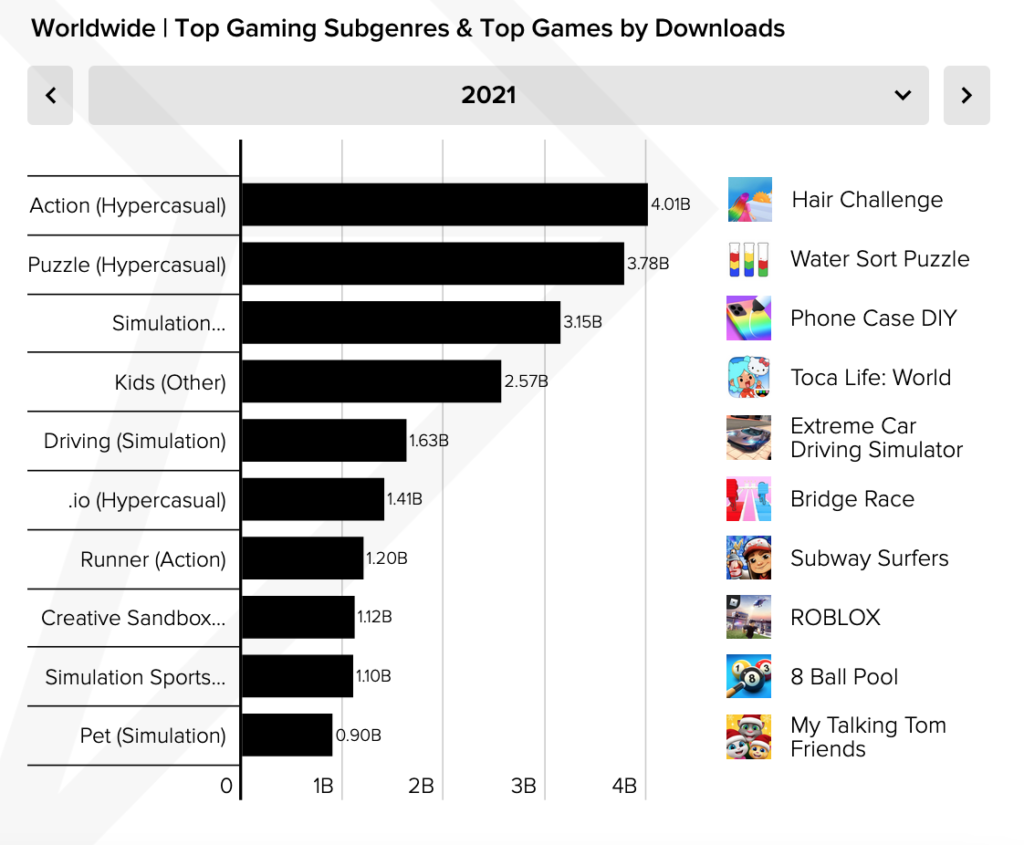
No surprises there either but TikTok was the most downloaded app of the year, and the one with the highest consumer spend. Its accompanying editing app, CapCut, also broke the top 10 of most downloaded apps of the year. However, Facebook was still gathering the most monthly active users of them all.
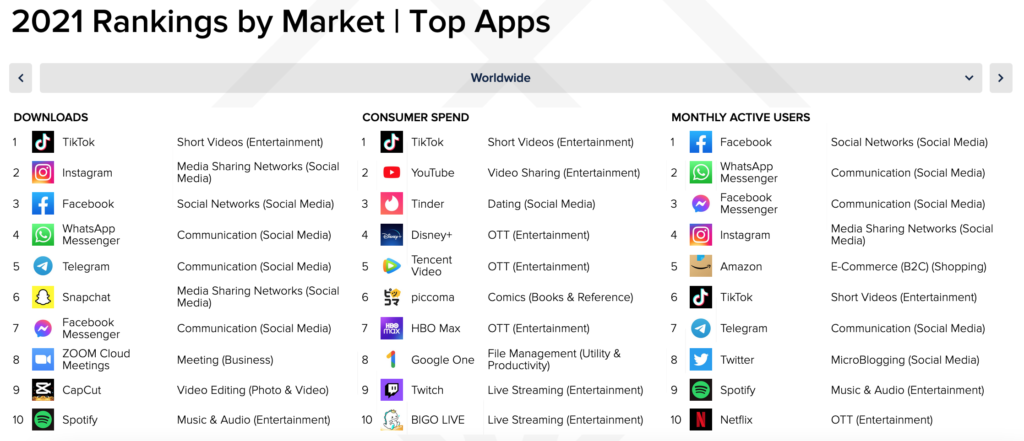
As for games, big names like ROBLOX, Genshin Impact, PUBG MOBILE, Candy Crush, and Subway Surfer are still the big winners. ROBLOX is still leading the charge with the most consumer spend worldwide.
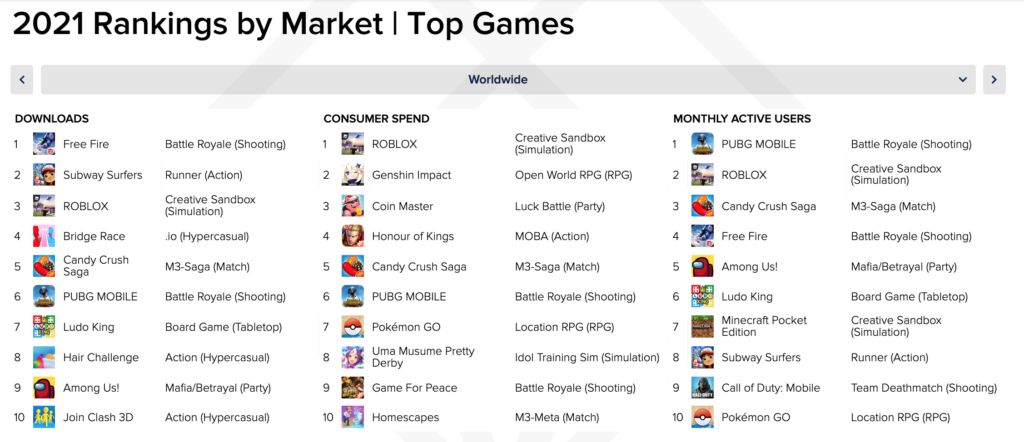
Some more App Store news
Unlisted apps
Apple deployed a new feature for their App Store called unlisted app distribution. Thanks to it, developers can now publish an app on the App Store that can only be installed through a direct link. Meaning the app cannot be found organically in the store (through search and discovery), it’ll only be accessible with a specific URL.
Unlisted apps will still need to go through Apple Review before being published. Once you’ve set the app as unlisted, you can’t undo it. Your app will stay unlisted until you delete it so don’t use it as a beta version of your app.
New discount codes
Developers can finally create custom discount codes for in-app subscriptions in the App Store. Before that, developers had to rely on one-time codes, generated for each person (they will still be available alongside customizable discount codes). The custom codes can be redeemed through a direct URL or directly within the app. Each app can have up to 150,000 codes per quarter, and custom offers will only work with devices running iOS 14.1 or later.
SocialPeta’s 2021 white paper on advertising & marketing is available
Mobile gaming recorded a skyrocketing growth in 2021, especially with the impact of the COVID pandemic in 2020. It is also worth mentioning that according to the 2021 mobile game industry white paper recently released by SocialPeta, 2021 had nearly 65k mobile game advertisers, North America remained Top 1 with a total of over 41K mobile game advertisers, up 18.72% YoY.

With these increasing statistics, the global mobile marketing competition became increasingly difficult. So as a marketing data analysis tool serving the mobile game industry for almost 10 years, SocialPeta reveals everything you need to know about winning in the mobile game market in this report, the mobile game advertising statistics in 2021, creative trends & tips, and marketing trend predictions to ensure you have the best.
There was a significant slowdown in the number of game advertisers in 2021 compared to 2020. Emphatically, SociaPeta recorded a 5% growth rate, in-game advertisers, in 2021 as compared to the 44% growth rate in 2020.
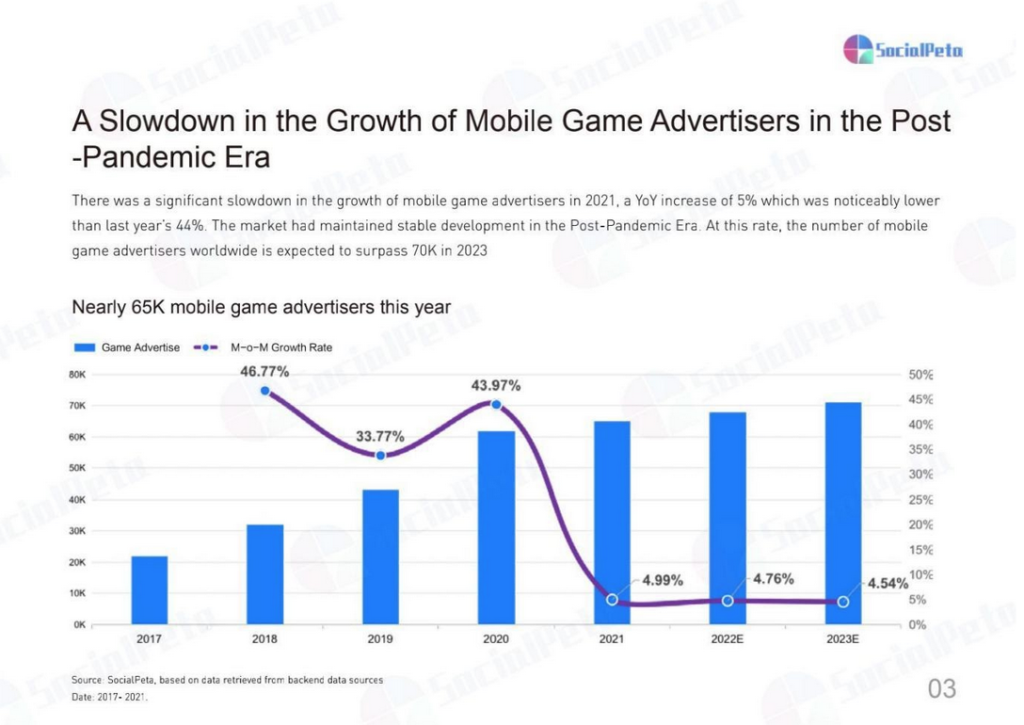
The average duration of creatives is 32.5 days, which increased by 87.9% in 2021. The reason for this is that advertising data shows classic materials are more popular in the market.
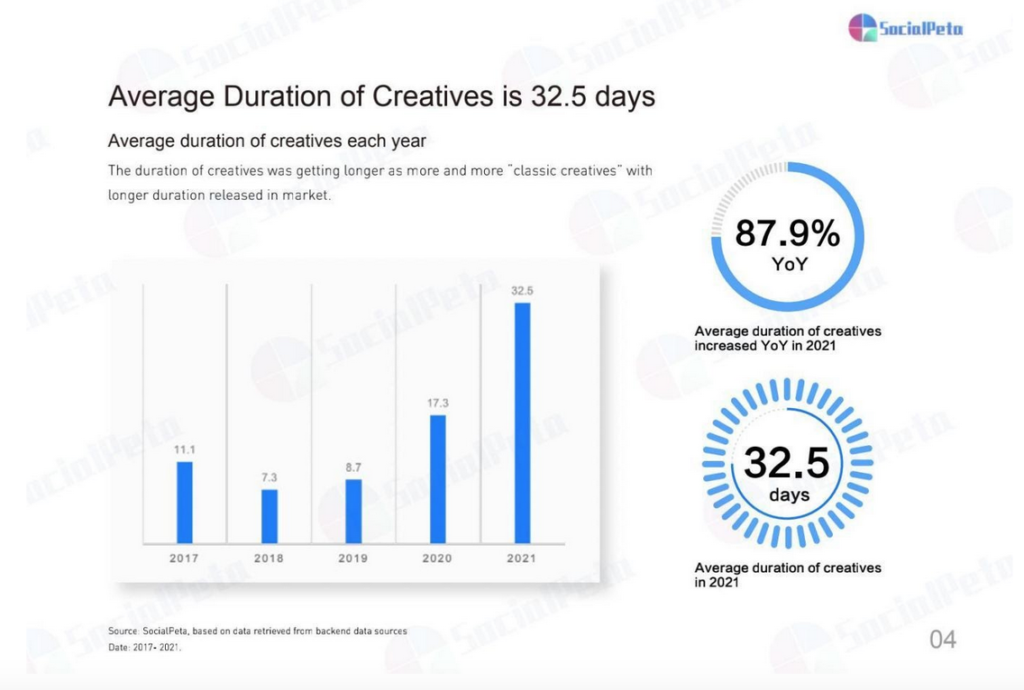
5.6M video ads creatives were placed in 2021, a 73% increase over 2020. Video creatives have become the mainstream of game advertising as a result of the constant upgrading of mobile devices, 5G networks, and the development of mobile technologies.
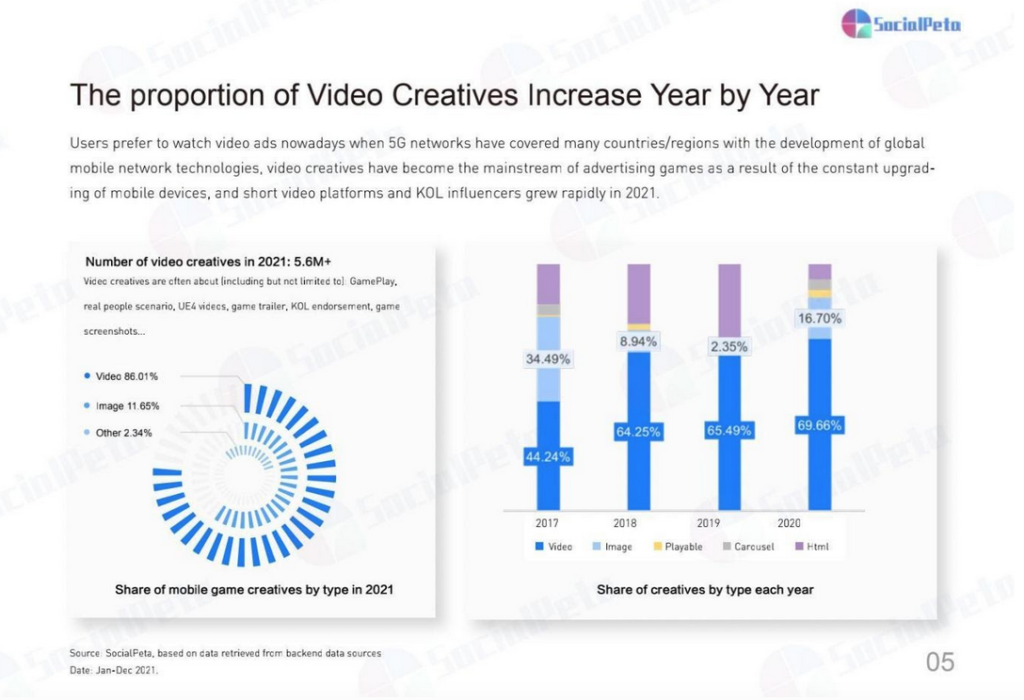
Casual games had the most advertisers, with more than 18k. Also, RPG games had the most significant number of creatives, with a total number of more than 6.6M.
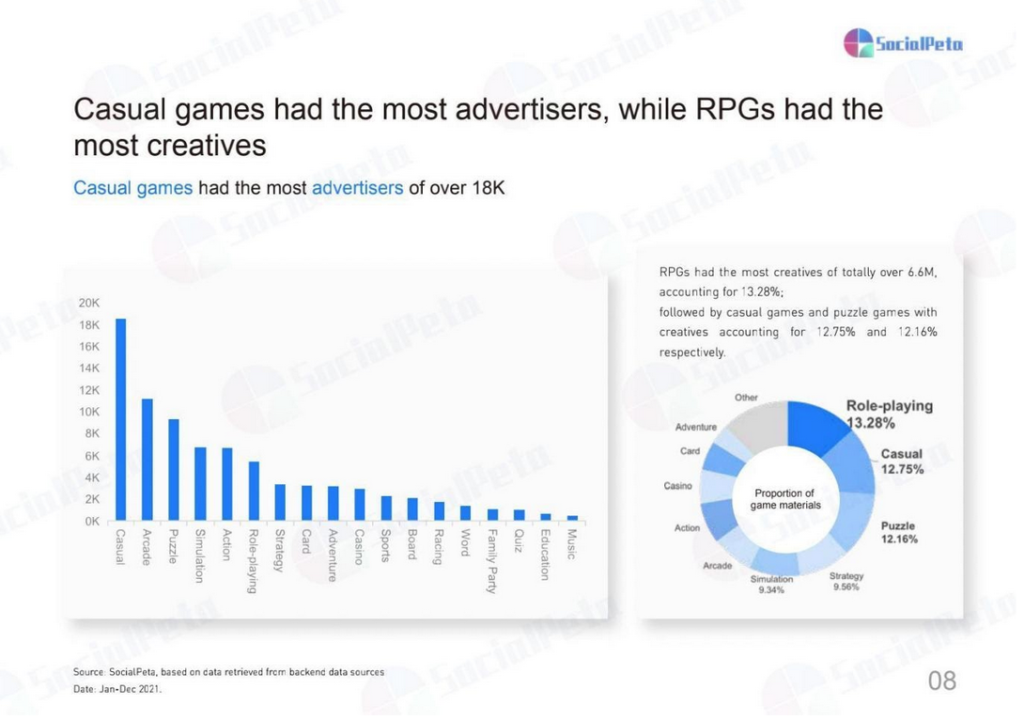
The CPM of mobile games on the meta platform increased by 34% in 2021. Also, the average CPM of mobile games in the U.S. exceeded $28, and this value equals to 93% increase over the average stat of 2020. The average CTR of mobile games is 1.28%, a YoY decrease of 29%.
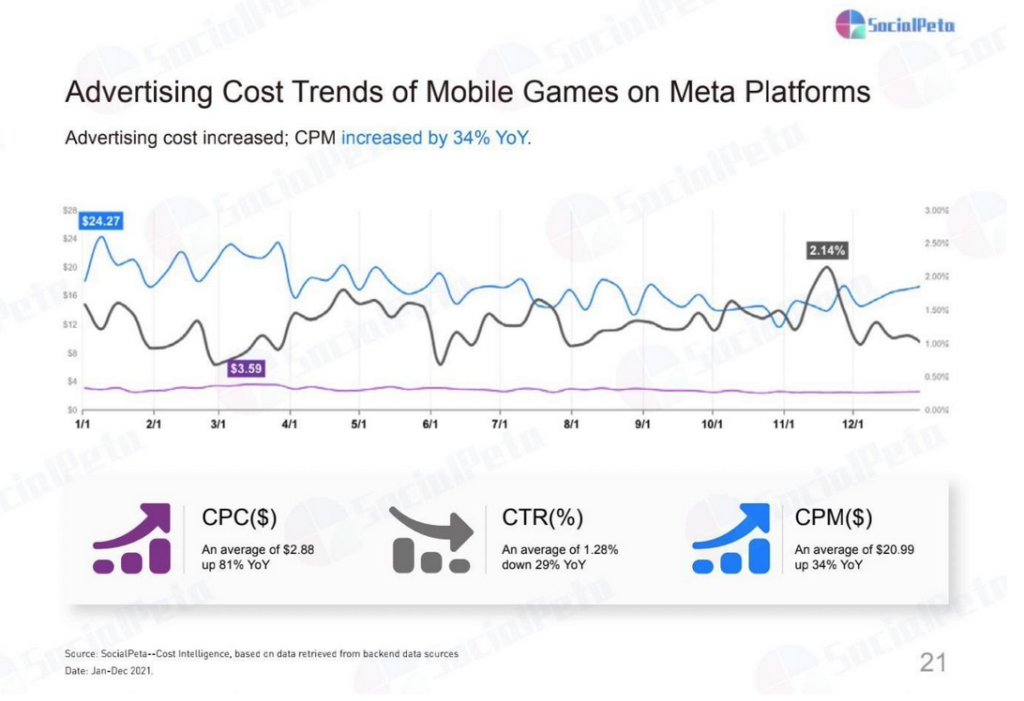
What’s more? Find out in SocialPeta’s 2021 global mobile game marketing & advertising whitepaper. To access this free full-packed data, visit SocialPeta 2021 Global Mobile Game White Paper.
Facebook rolls out their new privacy center
Facebook introduced a new Privacy Center, a tool providing “helpful information about five common privacy topics: sharing, security, data collection, data use, and ads”. Besides checking their account’s security and clearing up old posts, users will be able to access more ad controls and see which data was collected by Meta. They can delete the topics through which they’re targeted by advertisers (but they have to do so one at a time, it’s pretty time-consuming), forbid advertisers from targeting them outside of Facebook with data they collected on Facebook, and block third-party cookies.
As Social Media Today noted, this privacy center is nothing new. These options were already available to Facebook users before, they’re just a bit easier to find now. It may be a consequence of the $68M fine the French CNIL issued to Facebook impacting the freedom of consent and not providing a way to easily refuse cookies and trackers.
Right now, only some US desktop users can access this new privacy center. Meta will make it available to more users and apps soon.
Another step forward for the DSA
The European Parliament approved the initial draft of the Digital Services Act (DSA) with 530 votes of approval, 78 against, and 80 absentations. The DSA, along with its companion law the Digital Market Act (DMA), is part of the European Union’s goal to regulate the tech market.
The DSA would give users the ability to easily opt-out of ad tracking whenever they want. On the other hand, the DMA aims to fight big tech companies’ monopoly, including the power held by the Play Store and the App Store. This first step is a big one toward some huge changes to come in the app industry in Europe.
Numbers of the month
- European mobile app users spent $18.3 billion in 2021
- In-game ads expected to generate $14 billion by 2028
- Global app downloads hit 36.1 billion in Q4 2021
- App Store developers generated around $60 billion in 2021
- Consumer spending on mobile apps hit $170 billion in 2021
- People devote a third of waking time to mobile apps
- 7 of every 10 minutes on mobile was spent in Social and Photo & Video apps in 2021
- 2 million new apps and games released in 2021
- Mobile ad spend leapt 23% in 2021, on track to hit $350B this year
- Consumer spending in TikTok hit $2.3 billion in 2021
- Action mobile game player spending jumps 70%
- Budgets: Apps spent $78-$83 billion on user acquisition in 2021 – up 40% YoY
- Netflix’s mobile games surpass 8 million downloads
What we talked about this month
- Is Apple’s native A/B testing tool worth it?
- The Importance of A/B Testing ⎮ Guest Post by Gummicube
- Everything you need to know about Product Page Customization
- The rise of mobile gaming in 2021
- Boost conversion with Apple’s in-app events
January’s App Marketing Snack interviews
- The App Marketing Snack with Clark Stacey, CEO of WildWorks ⎮ Episode 1
- The App Marketing Snack with Ryan Kelley, ASO Specialist ⎮ Episode 2
- Mobile Video Monthly #38 – November 2023 - 5 December 2023
- Disturbing ads, a new trend for mobile gaming creatives? - 28 November 2023
- The Power of Holiday Marketing in Boosting Mobile Game Engagement - 21 November 2023










